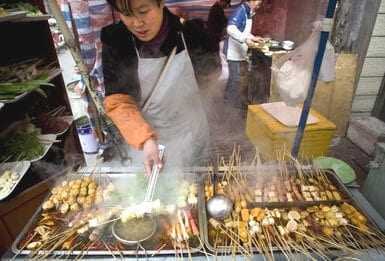Chinese food tends to be oily. In northern China it’s soy oil, in the south peanut — and from wok-fried to stir-fried to broiled most recipes require at least some oil, many a great deal. Just last night I was at a Sichuanese restaurant and one of the dishes I ate (delicious, I might add) was strips of carp gently stewed in oil with Sichuan pepper, chili, garlic and bean sprouts, and at the end of the meal the serving bowl still had perhaps a half-litre of peanut oil in it. Furthermore, the custom of finely chopping ingredients before cooking them allows a greater absorption of cooking oil and seasoning and the resulting dishes, for instance the popular ‘fish-flavoured eggplant’ are saturated with the fragrant liquid. However oil has not always been used so generously, in fact the Chinese traditionally used animal fats and lard when cooking, and these only in small quantities.
The rise in the use of cooking oils has been provoked by the economic growth of the past two decades which has made oil, once scarce and prohibitively expensive, common and affordable. This has been complemented the modernization of oil production and processing, which has made many seed and vegetable oils cheaper and more abundant. The switch to oil also reflects Chinese ideas of the health properties of foods, as vegetable and seed oils are believed to be healthier than animal fats. The prevalence of oil in Chinese food is even cited as an explanation for why Chinese people are generally quite slim compared to westerners, the logic being that oil makes food slippery and allows it to pass through the system, whereas western foods like bread, cheese and meat, being dry and sticky, remain in the body for longer and are absorbed as fat.
The importance of oil in China is further reflected in the media, with tragic stories of customers in supermarkets being crushed by stampeding crowds when specials are announced on cooking-oils and chilling exposes of toxic ‘recycled oil’, obtained by processing sewage, which is re-branded and sold or used in restaurants. So it is not surprising that olive oil is becoming increasingly popular in China (imports have increased since 2001 by almost 70% each year), as its health benefits and the perception that foreign brands assure a guarantee of quality and authenticity appeal to Chinese consumers.
There is, however, confusion regarding the product; many Chinese are unsure of the significance of ‘extra-virgin’ or ‘pomace’ when it comes to distinguishing oils, or how their uses in cooking vary. This last is especially relevant as whilst more and more middle-class Chinese are eager to buy imported products, they are generally unfamiliar with foreign cooking techniques. So whereas pure olive oil is a good substitute for other processed vegetable and seed oils and suitable to the high temperatures of Chinese cooking, virgin or extra-virgin olive oil is harder to adapt, as the intense heat of wok cooking destroys its flavor and health properties, and Chinese food is rarely garnished with oil after it has been prepared.
Nevertheless the trend is shifting, as the growing internationalism of major urban centres encourages culinary awareness among middle and upper class Chinese. Events like the 2008 Beijing Olympics and 2010 Shanghai World Expo have flooded both cities with foreign visitors and companies, many of whom are eager to penetrate the Chinese market. The olive oil industry now receives annual exposure at the ‘Oil China’ trade fair, including awards for best oils and live demonstrations of how to use olive oil in Chinese cooking. And the popularity of Italian restaurants, many of which advertise the use of olive oil on their menus, further encourages Chinese consumption. So, whilst for now olive oil occupies only a tiny fraction of the Chinese edible oils market, with the proper mix of good publicity and adaptation to local gastronomic customs there is enormous potential for expansion.




